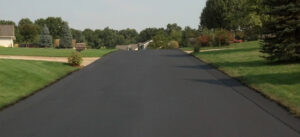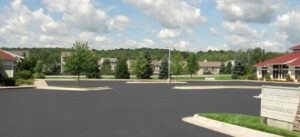Asphalt Vs Concrete
Asphalt Vs Concrete – Which Wins the Battle?
Asphalt and concrete are two common terms when it comes to driveway repair. Both feature a gravel base with sand and stone. However, they differ in their adhesive materials. Asphalt makes use of a petroleum-based adhesive while the adhesion in concrete is due to cement. When a comparison is made between asphalt and concrete, both have their own merits and demerits.
Asphalt tends to get damaged faster than concrete while it can also be fixed more easily. Cracks in asphalt can be filled or sealed faster. Asphalt is also cheaper than concrete. On the other hand, concrete lasts longer and is not prone to wear and tear as fast as asphalt.
What you should know about an asphalt driveway
Asphalt driveways are affordable and easily installable. However, they require sealing on an ongoing basis. Sealing should be done for the first time six months after installation. After this, the sealing must be carried out once in three to five years. Homeowners can do this process themselves without professional assistance.
An asphalt driveway tends to have limited durability than its concrete counterpart. However, with good maintenance, it can last for about ten to twelve years. Moreover, unlike concrete, aesthetic and design options are limited with asphalt.
Importance of sealcoating
If asphalt is chosen, then sealcoating must be done whenever required. This acts as a protective layer and enhances the lifespan of the asphalt driveways or pavements. It also helps in increasing the friction and prevents vehicles from skidding. The surface must be dried and cleaned with a blower before a sealcoat is applied. If not, the adhesion will be poor and the coating will not yield the desired results. In the sealcoating process, two coats must be applied.
The sealer can be applied using pressurized spray equipment, hand-held squeegees or self-propelled squeegees. If assistance is needed, companies like Skye Asphalt in Plano, TX can be to help.
Why is concrete a better option?
As mentioned above, the key advantage of concrete is its durability and long-lasting property. Also, concrete supports customization that makes it ideal for those who are looking for different aesthetic or design options for their driveways or pavements.
However, it is more expensive than asphalt and is also less flexible. This means that in case of damage, it cannot be fixed as easily as asphalt. Moreover, curing takes up to a week. Last but not least, oil and gas spills are more clearly visible on concrete.
The choice of asphalt over concrete or vice versa is purely a matter of personal choice. Both of them have their pros and cons that are worth considering before making a final decision. While asphalt requires more maintenance, it is easier to fix asphalt driveways and pavements in case of damage. However, maintenance is less with concrete but damages can take more time to repair and are difficult to fix. If a long life is one of the most important parameters, concrete will last about ten years more than asphalt.




